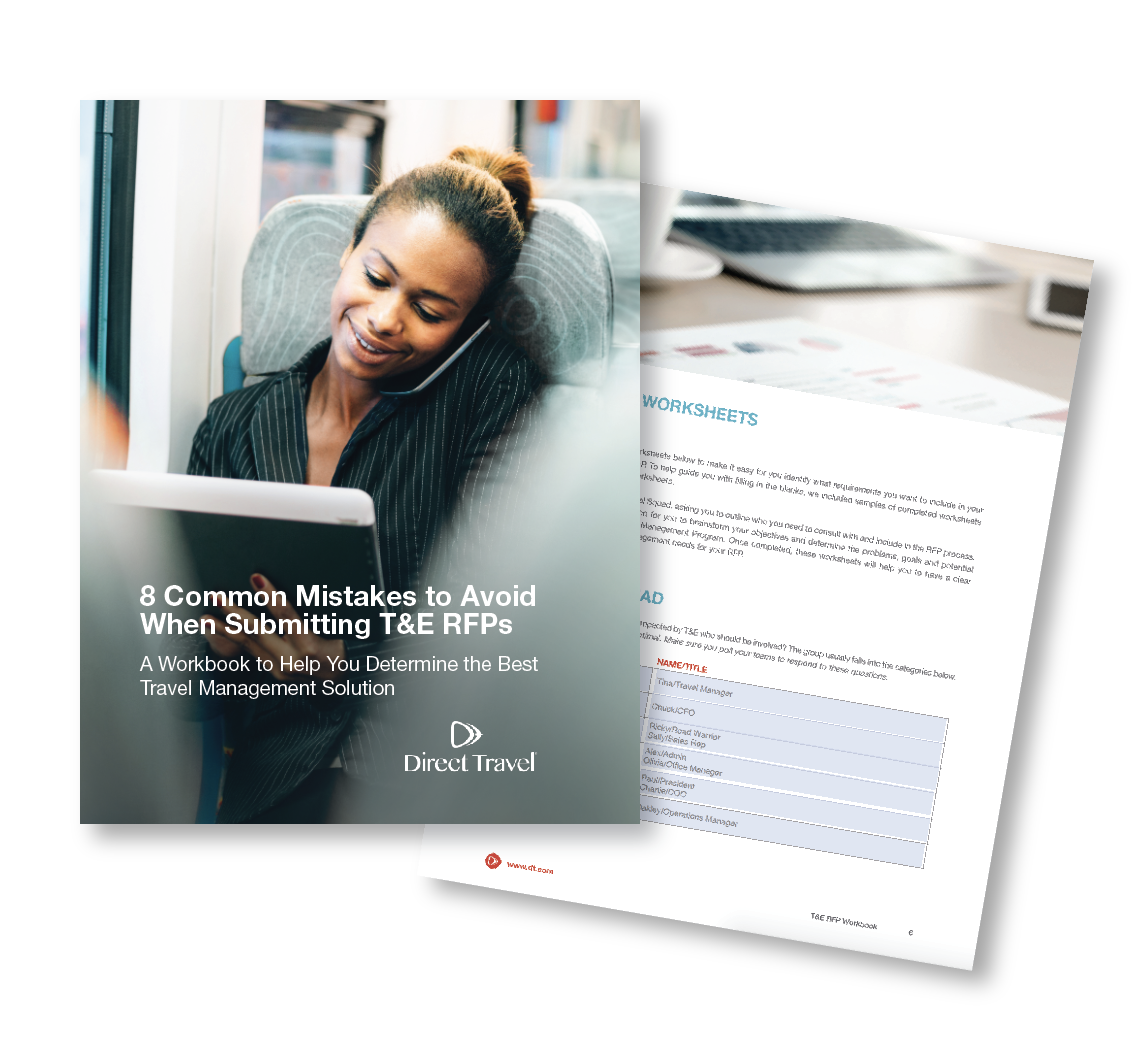An effective travel management Request For Proposal (RFP) uses data to establish precise goals and realistic timelines. When travel managers have a transparent view of their historical data, they can more effectively craft a proposal that secures favorable discounts, amenities and other advantages that both enhance their travelers’ comfort and convenience while positively impacting their bottom line.
But what does it take to turn a good RFP into a great one?
Go Beyond Money and Booking
A TMC that comes to the table with a plan to reduce your short-term costs is a good place to start, but if there’s no dynamic plan for the future, your organization could end up paying more down the road. The travel management industry changes constantly, so your TMC needs to be able to adapt quickly and support your organization with customized and timely solutions.
Think beyond fee reductions and quarterly discounts. Your TMC partner should be able to leverage your data to identify opportunities to actively and sustainably manage your cost structure. Moreover, it should monitor available technology offerings to continually improve your organization’s ability to respond to market changes with agility and efficiency. No one can plan perfectly for the future, but an effective TMC will have a strategy for supporting your enterprise, no matter what happens.
Accordingly, when crafting your RFP – or reviewing a TMC’s response to it – a primary consideration should be the level of sophistication of their reporting capabilities and the ability to provide your company with customized views of your travel program from multiple perspectives. Ad hoc reporting should always be available, and at a fee that is reasonable and proportionate to your total travel spend.
Also consider how potential TMC partners can support your travelers. As you approach the RFP process, ask stakeholders where support is needed. This should include your company’s internal travel managers/arrangers, as well as your travelers. For instance, how many touch points are there during the booking process? Does the TMC continue to support travelers on the road? The cost of poor service can be substantial, especially if travelers run into trouble on the road. Increased support from your TMC partner should not only reduce risk throughout your program, but it can also be a significant factor in supporting your traveling employees’ morale.
This leads to the critical issue of Duty of Care. Duty of Care should be foremost among the factors impacting your selection of a TMC for both your most senior executives and corporate travel managers/arrangers alike: it’s a company’s responsibility to ensure your employees’ safety while they are on the job, including when they’re traveling for work.
Obviously, this is a major consideration for corporate entities whose travelers must regularly conduct business in high-risk locations. Even in destinations that are considered low risk, there may be unforeseen threats or developing situations that make Duty of Care more important than ever.
Lose the Boilerplate
Don’t base your selection of a TMC on a series of hypothetical scenarios. Instead, look for carefully documented case studies that may demonstrate effective solutions to problems closely resembling challenges to your travel program. An RFP template will only get you so far. An insightful TMC contender will offer your company a strategic approach that uses real data from actual situations and challenges that you have thoughtfully profiled in your RFP.
Business Travel News recommends that stakeholders take the time to collect data before sending out an RFP. In addition to traveler requirements and recent supplier transactions, your data should include a granular breakdown of total transactions for the previous three years. Gather information about specific supplier transactions, potential program leakage, fees paid and program growth projections. Group this data by region and channel to provide a clear overview of where each travel dollar has gone and how it impacted the bigger picture. Defining air, ground and lodging within their own categories will make it easier for stakeholders to identify potential solutions. You won’t overwhelm a competent TMC with data—it’s their job to process metrics and identify strategic opportunities.
Diversify Traveler Personas
From the travel manager to the CFO to the road warriors, everyone expects something different from travel management. Before approaching TMCs, take the time to survey all your travelers about what they believe makes a good partnership. For instance, how do they feel about their current level of support on the road? Do they feel supported when they encounter challenges while traveling, or do they have to fend for themselves?
Once you understand what everyone would like to see from a potential TMC partnership, you should formalize these desires before contacting potential partners. An effective TMC will be able to address these needs with new technologies, policy recommendations and negotiation strategies. Be prepared to follow up on each point as you evaluate proposals and negotiate the final contract. If you don’t understand any part of a prospective TMC’s proposal, take the time to ask for clarification. A skilled TMC should be able to provide transparent insights and amplification into its proposed solutions. If it can’t, you know they’re not the right fit.
Study Your RFP Before Formally Issuing It
A seemingly universal flaw in travel management RFPs is the practice of asking redundant—or nearly identical—questions. Be deliberate in your wording, and ask each question with a specific point of inquiry. Another common convention in RFPs is the multi-faceted question. If you have a question that requires more than two or three sub-points, it’s best to divide it into separate, specific questions. Long responses will likely be skimmed by most readers on your team of bid reviewers. Brevity in your questions will lead to more focused, informative submissions.
Getting ready for a travel management RFP? A travel program is only as good as the intelligence behind it. Download our workbook now to get started on finding the perfect TMC partner.
8 Common Mistakes to Avoid When Submitting T&E RFPs
A Workbook to Help You Determine the Best Travel Management Solution






